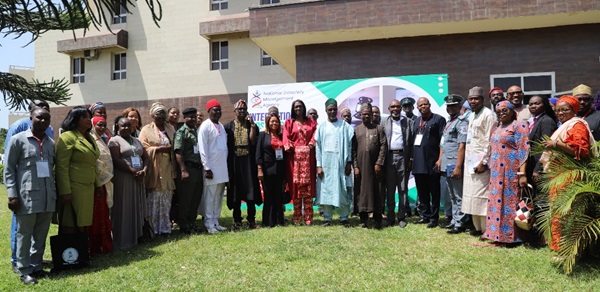
The Minister of Environment, Balarabe Lawal has touted biosafety as bring critical to achieving global food security, public health and sustainable environmental practices.
Speaking at the 2024 International Biosafety Conference organised by the National Biosafety Management Agency (NBMA) in Abuja, themed “Biosafety: An Indispensable Tool for Achieving Food Security, Health Improvement and Environmental Sustainability in Nigeria,” Lawal highlighted biosafety as a foundation for resilient food systems and ecosystems.
“Biosafety is essential to our collective security, with lasting impacts on the health of our ecosystems, the resilience of our food systems, and the well-being of our communities,” Lawal said. He noted that biosafety supports a sustainable national development strategy, particularly through responsible biotechnological innovation.
Lawal further asserted the Ministry’s commitment to biosafety as a safeguard that ensures biotechnology complements rather than compromises biodiversity while addressing human health risks. He stressed that as technological advancements in biotechnology and genetic engineering accelerate, they offer new solutions to address challenges in hunger, disease and environmental conservation.
He encouraged Nigerians to prioritise safe, ethical use of biotechnologies aligned with global sustainability commitments and urged citizens not to see genetically modified foods as harmful, assuring that NBMA works to protect Nigeria by ensuring only safe, beneficial biotechnological products are accessible.
“With a rapidly growing population and climate challenges, including insecurity, flooding and drought, Nigeria must balance biotechnology innovation with biodiversity preservation and health safety,” he explained, highlighting the Federal Ministry of Environment’s commitment to implementing the Cartagena Protocol on Biosafety through NBMA.
Lawal also outlined the potential of advanced biotechnologies to increase crop yields, improve pest resistance and enhance nutrition through biofortification, thereby combating malnutrition and promoting public health. Additionally, he noted the environmental benefits of biotechnology, such as reduced pesticide use, while stressing the ministry’s prioritisation of safety through rigorous regulatory standards to mitigate risks like gene flow.
The minister called for collaboration to strengthen Nigeria’s biosafety system through science-based risk assessments, transparency, public participation, regulatory enhancement and capacity-building to support responsible bio-innovation.
Director-general of NBMA, Dr. Agnes Asagbra echoed these sentiments, emphasising biosafety’s role in protecting human health, animal welfare and the environment. “In an era marked by climate change, pandemics and food insecurity, our commitment to biosafety is more crucial than ever,” she said, encouraging efforts to align biosafety with sustainable development goals.
Keynote speaker, Prof. Sylvia Uzochukwu stressed that biosafety in biotechnology is vital to harnessing the benefits of technological innovation while minimising risks to food security, public health and environmental sustainability. She encouraged NBMA to engage communities for greater public trust and acceptance of genetically modified foods.
Former NBMA director-general, Dr. Rufus Ebegba praised the agency’s growth, noting that the National Biosafety Conference has now reached an international scale. “NBMA is among Africa’s leading biosafety agencies, ensuring biotechnology is safe for Nigeria’s economy and the prosperity of our people,” he said.
Chair of the local organising committee for IBioC24, Mrs. Hauwa Ahmed stated that NBMA’s mission is to safeguard Nigeria by overseeing the safe application of biotechnology. “Today’s conference aims to clarify our role nationwide and build confidence in our adherence to national and international laws and guidelines,” she said.
NBMA also awarded five individuals, including Ebegba, for their outstanding contributions to the agency’s mission.

